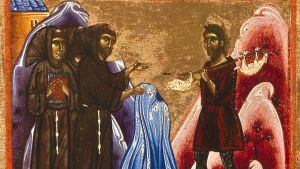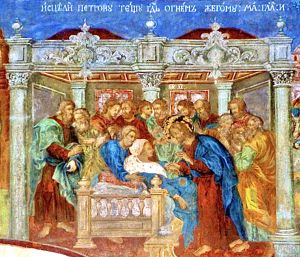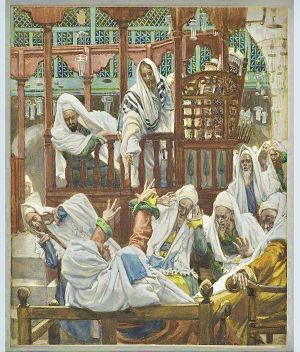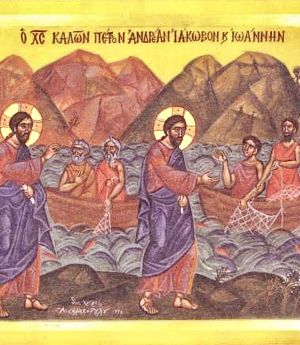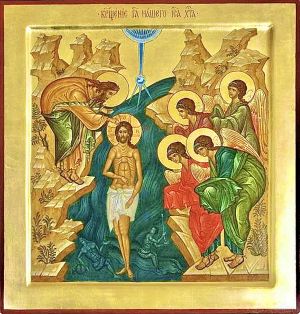
Teresa Girolami
Teresa Girolami è laureata in Materie letterarie e Teologia. Ha pubblicato vari testi, fra cui: "Pellegrinaggio del cuore" (Ed. Piemme); "I Fiammiferi di Maria - La Madre di Dio in prosa e poesia"; "Tenerezza Scalza - Natura di donna"; co-autrice di "Dialogo e Solstizio".
Mk emphasises the meaninglessness of fasting while the Bridegroom Jesus is still with his own and it is feast time!
When the Bridegroom is taken away then they will fast.
Moreover, one does not put new wine in old wineskins, says the Lord, otherwise one loses both.
Let us look in the Sources.
Although Francis was a creature who practised countless fasts, he knew well how and when it was appropriate to do so.
He was clear about fasting not as an end in itself but functional to the value of the person before God.
Not fidelity to the law per se, but to the Gospel.
In this context we can well understand the episodes offered by the Sources.
We read:
"Much had he laboured in the vineyard of the Lord, solicitous and fervent in prayers, fasts, vigils, preaching and gospel wanderings, in care and compassion for his neighbour, in contempt for himself: and this from the beginning of his conversion until the day he migrated to Christ.
He had loved Jesus with all his heart, constantly keeping his memory in mind, always praising him with his words and glorifying him with his fruitful works' (FF 1482).
Again:
"He showed great compassion for the sick and tender solicitude for their needs.
If at times the goodness of the seculars sent him some corroborant for his health, he gave it to the other sick, when he needed it most of all.
He made their sufferings his own and consoled them with words of compassion when he could not bring them relief.
She even ate on fasting days, so that the sick would not feel flushed, and she was not ashamed in the public places of the city to beg meat for a sick brother" (FF 761).
Clare made fasting the place for the manifestation of joy for the love of her Spouse, an exercise of great solicitude.
The Sources inform us:
"And while it usually happens that bitter physical mortification produces depression of spirit as a consequence, quite different was the effect that shone out in Clare: in all her mortifications she maintained a joyful and serene aspect, so that she seemed not to feel or laugh at the anxieties of the body.
From this we can clearly see that she overflowed outwardly with the holy joy with which her inner self abounded because the love of the heart took away all harshness from the scourges of the body" (FF 3196).
Francis and Clare bore witness to true fasting; what it means in daily life to live the Word 'new wine in new wineskins' (Mk 2:22).
Monday, 2nd wk. in O.T. (Mk 2:18-22)
The Baptist points to Jesus-Lamb who takes away the sin of the world.
He is the Witness of the dove that alights and remains on the Son of God.
Francis, a gift from Heaven sent to prepare the ways of God, after Providence led him to a complete conversion, was transformed by the Spirit into a Prophet for his time and beyond.
In the Major Legend, St Bonaventure presents us with the figure and experience of the Poor Man of Assisi.
Like John, born to point to the Lamb of God, so was the young merchant's son.
Renewed by his spiritual rebirth, he sang the Mystery of the Incarnation in the fibres of his own flesh.
In the Sources:
"The Grace of God, our Saviour, has appeared in these last days in his servant Francis, to all those who are truly humble and truly friends of Holy Poverty.
For while they venerate in him the superabundance of God's mercy, they are instructed by his example to renounce radically impiety and worldly desires, to live in conformity with Christ, and to yearn with insatiable thirst and desire for the blessed hope.
God looked upon him, truly poor and contrite of heart, with great condescension and goodness; not only did He raise him, a beggar, from the dust of worldly life, but He made him a champion, guide and herald of evangelical perfection and chose him as a light for believers, so that, having become a witness of light, he might prepare for the Lord the way of light and peace in the hearts of the faithful" (FF 1020).
"Like the morning star appearing in the midst of the clouds, with the most brilliant rays of his life and doctrine, he drew those who lay in the shadow of death towards the light; like the rainbow shining among the luminous clouds, bearing within himself the sign of the covenant with the Lord, he announced to men the Gospel of Peace and salvation.
Angel of true peace, he too, in imitation of the Precursor, was predestined by God to prepare the way for him in the desert of extreme poverty and to preach penance by example and word" (FF 1021).
«I saw the Spirit descend like a dove from heaven, and it remained on Him» (Jn 1:32)
2nd Sunday in Ordinary Time, year A (Jn 1:29-34)
Today the liturgy proposes, through the Gospel of Mark, the metamorphosis of Levi, who became Matthew to follow Jesus in the adventure of his vocation.
The concern of Jesus, who came to call not the righteous, but sinners, is highlighted.
When the divine Light made him realise that the Lord was calling him to follow in His footsteps, Francis left everything immediately and devoted himself to how he could better live the Gospel.
Jesus had made it clear to him that Mercy must always prevail in events.
In the Sources:
"Oil and wine, rod and staff, zeal and indulgence [...] everything has its time. All this is required by the God of vengeance and the Father of mercies: but he prefers mercy to sacrifice' (FF 763).
One day while he was praying he heard himself say:
«Francis, if you want to know my will, you must despise and hate everything that you worldly love and desire to possess. When you have begun to do this, what was previously attractive to you will seem unbearable and bitter» (FF 1407).
Hence his love for lepers:
"After a few days, he took a lot of money with him and went to the lepers' hospice; he gathered them together and distributed alms to each one, kissing their hands.
On his return, the contact that had previously been repugnant to him, that is, seeing and touching lepers, was truly transformed into sweetness" (FF 1408).
Already, the divine Master feasts on the sick, he does not abhor them, because it is they who need the physician and by them Francis was healed in soul.
"One day, full of admiration for the mercy of the Lord in all the benefits bestowed upon him, he wished to know from the Lord what would become of his life and that of his brothers.
To this end he withdrew, as he often did, to a place suitable for prayer. There he remained for a long time, invoking with fear and trembling the Ruler of all the earth, looking back with bitterness on the years that had passed badly and repeating:
«O God, be merciful to me a sinner!».
Little by little he felt in the depths of his heart ineffable joy and immense sweetness.
He began as it were to come out of himself: the anguish and the darkness, which had thickened in his soul through fear of sin, disappeared, and the certainty of being forgiven of all his faults and of living in the state of grace was instilled in him" (FF 363).
«I did not come to call the righteous, but sinners» (Mk 2:17b)
Saturday 1st wk. in O.T. (Mk 2,13-17)
In front of an extraordinary crowd, here is an astounding fact for onlookers: in Capernaum, Jesus heals and forgives the sins of a paralytic who was lowered from the roof by four people.
The Sources attribute to Francis 10 prodigies relating to healed paralysis. In the Major Legend there is ample mention of them.
We quote some of them to testify how the Lord worked through his servant.
We read: "There was near the town of Orte, a child all shrunken up, who had his head joined to his feet and several bones broken.
Moved by the tears and prayers of his parents, the Saint blessed him with the sign of the cross, and he got up with his limbs well stretched out, instantly healed' (FF 1216).
And again: 'In the diocese of Rieti, a weeping mother presented her child to him, who had been so swollen for four years that he could not even see his own legs: the Saint barely touched him with his sacred hands and made him perfectly healthy' (FF 1215).
Where eminent Faith is alive, God works wonders with his instruments.
Francis of Assisi is the servant of the Most High who disappears into his nothingness to leave space for the healing power of the Spirit.
He is the jester of Grace on this poor earth.
«And seeing Jesus their faith, he said to the paralytic: Son, your sins are forgiven» (Mk 2:5)
Friday 1st wk. in O.T. (Mk 2,1-12)
«There came to him a leper [...] He had compassion on him, stretched out his hand, and touched him»
In the Gospel passage from Mk, Jesus shows compassion towards a leper on the margins of society, into which he intends to reintegrate him.
The Poor Man's encounter with the lepers constitutes a fundamental page of his existence, which profoundly alters him and changes the coordinates of his interior life.
For them he feels compassion and "passion", willing to help them in any way he can, because he is the Suffering Servant.
We read in his wonderful Testament
«The Lord gave me, Brother Francis, to begin to do penance in this way: when I was in sin, it seemed to me too bitter to see lepers; and the Lord himself led me among them and I used Mercy with them. And as I turned away from them, what seemed bitter to me was changed to sweetness of soul and body» (FF 110).
Thus "the Saint goes among the lepers and lives with them, to serve them in every need for the love of God. He washes their decaying bodies and heals their virulent sores [...].
For the sight of lepers, as he attests, was at first so unbearable to him, that as soon as he saw their shelter two miles away, he plugged his nose with his hands.
But here is what happened: at the time when he had already begun, by the Grace and virtue of the Most High, to have holy and wholesome thoughts, while he was still living in the world, one day a leper stood before him: he did violence to himself, approached him and kissed him. From that moment he decided to despise himself more and more, until through the mercy of the Redeemer he obtained full victory" (FF 348).
And Francis healed many lepers:
"In the city of Fano, a young man named Bonomo, considered by all the doctors to be a leper and a paralytic, as soon as he was offered very devoutly by his parents to Blessed Francis, was freed from leprosy and paralysis and regained full health" (FF 564).
The care he lavished on lepers, as the Good Samaritan of the Gospel, was transformed, by the gift of the Lord, into power and efficacy in healing diseases of body and spirit.
He had visceral compassion for these souls abandoned to themselves and lived the Gospel of the derelict and marginalised to the letter, loving with extraordinary fondness the Lazaruses of his time and beyond.
Thursday 1st wk. in O.T. (Mk 1:40-45)
Behold the Lamb, in lambs. Giovanni, Francis and Clare. Witnesses
«He healed many who were afflicted with various diseases»
Preaching and healings.
In today's Gospel, Mark presents Jesus on his mission, preaching and healing many, starting with Peter's mother-in-law.
He who was called the Minim, Francis, was so conformed to Jesus that he received from Him thaumaturgic energies and the power of innumerable healings.
In the Sources there are many episodes of lepers being healed, of the blind regaining their sight, of the dead being raised, of women escaping the dangers of childbirth, and so on.
We propose a few.
"A hydropic man from Fano, his body fearfully swollen, was perfectly healed through the merits of the glorious servant of God.
An inhabitant of Todi suffered from arthritic gout so bad that he could not even sit or lie in bed. The vehemence of the disease threw him into constant chills, so that he seemed close to death. He called for doctors, multiplied baths and medicines, but all was in vain. One day, however, in the presence of a priest, he made a vow to St Francis, imploring the grace of healing. And immediately he was healed" (FF 558).
"In the countryside of Arezzo, a woman had been in labour for many days and was close to death. In that desperate situation, there was no remedy left for her except from God. Well then, the servant of Christ had just passed by on horseback, and it happened that, in bringing the beast back to his master, those in charge passed by the poor woman's village. The local people, seeing the horse on which the saint had travelled, tore off his reins and placed them on the woman's body.
At that miraculous contact, all danger disappeared and the woman, safe and sound, immediately gave birth" (FF 1220).
Francis "Alter Christus" knew that the Spirit was sending him to preach the Good News of the Kingdom everywhere and for this mission he did not spare himself.
We read in the Sources
"He had preached once to the people of Terni and the bishop of the city, while at the end of the preaching addressed words of praise to him in front of everyone, expressed himself as follows:
"In this last hour, God has enlightened his Church with this poor man of no merit, simple and uneducated.
Therefore we are bound always to praise the Lord, knowing that he has not done so with any other people'.
Hearing these words, the saint accepted with incredible pleasure such clear words, and entering the church, he threw himself at his feet, saying:
"Truly, Mr Bishop, you have done me great honour, for while others take it away from me, you alone have left intact what is mine.
You have separated, I mean to say, the precious from the vile, and, prudent man that you are, you have given praise to God and me my misery' (FF 725).
"He then went on to preach in the neighbouring places" (FF 1207).
Francis, rich only in the Holy Spirit, lived his mandate with the awareness of one who knows he must return to God the gift received.
«Let us go elsewhere, to the neighbouring villages, that I may preach there also; for this am I come» (Mk 1:38)
Wednesday 1st wk. in O.T. (Mk 1:29-39)
Jesus heals in the synagogue a man possessed by an unclean spirit, forced to recognise who Jesus, «the Holy One of God», is.
The greatest defeat of evil is to be forced to recognise the Good!
Even the Poor Man of Assisi, in the footsteps of Christ, attests to the greatness of God who uses the small as the cradle of the Great.
In the Sources, rich in healings that occurred through the Spirit working in Francis, we find indicative episodes.
"A friar was tormented by an illness so frightening that many believed it was more a diabolic vexation than a natural infirmity.
In fact, he often struggled all over his body and rolled around with frothing at the mouth; his limbs appeared now shrunken, now stretched out, now bent and twisted, now stiff and hard.
At times, all tense and stiffened, with his feet at head height, he would leap into the air, only to fall back with a hideous thud.
The servant of Christ, full of mercy and compassion for that unfortunate man, so miserably and irretrievably stricken, made him take a bite of the bread he was eating.
On tasting that bread, the sick man felt such miraculous strength within him that from that moment on he no longer suffered from that infirmity' (FF 1219/11).
That bread, a sign of intimate conviviality, had freed him!
Again the Sources recall:
"Since the herald of Christ was famous for these and many other prodigies, people paid attention to his words, as if an Angel of the Lord were speaking.
Indeed, the prerogative of the lofty virtues, the spirit of prophecy, the thaumaturgic power, the mission to preach coming from heaven, the obedience of creatures deprived of reason, the sudden conversions of hearts brought about by hearing his word, the knowledge infused by the Holy Spirit and superior to human doctrine, the authorisation to preach granted by the Supreme Pontiff by divine revelation, as well as the Rule, which defines the form of preaching, confirmed by the Vicar of Christ himself and, finally, the signs of the Supreme King impressed like a seal on his body, are like ten testimonies for the whole world and confirm without a shadow of doubt that Francis, the herald of Christ, is worthy of veneration for the mission he received, authentic in the doctrine he taught, admirable for his holiness and that, therefore, he preached the Gospel of Christ as a true envoy of God" (FF1221- Major Legend).
The Word emphasises: «I know who you are, the Holy One of God» (Mk 1:24).
Just like that! The heavens tell of the Glory of God; the Holiness of Him spreads over the works of His Hands!
Tuesday 1st wk. in O.T. (Mk 1,21b-28)
Jesus, during his preaching and passing by the Sea of Galilee, calls to his retinue the first four disciples who, having left their nets, are about to become involved in the Gospel adventure for the Kingdom.
Francis feels the call to become a "fisherman" of men from the very beginning of his evangelical parable.
"Francis, who, never trusting in himself, sought inspiration from God in prayer in every decision, chose to live not for himself alone, but for Him who died for all, well aware that he had been sent by God to conquer the souls that the devil was trying to kidnap" (FF 381).
The explicit call that Christ had addressed to him had induced him to leave the nets of worldly life to become a herald of the Truth of the Gospel.
"In the church of the Virgin Mother of God dwelt, therefore, his servant Francis and insistently begged with continual groans She who conceived the Word full of grace and truth, that She might deign to become his advocate. And the Mother of mercy obtained by her merits that he himself conceived and gave birth to the spirit of gospel truth.
As he devoutly listened one day to the Apostles' Mass, he heard the Gospel passage recited in which Christ, sending the disciples to preach, gives them the Gospel way of life, saying:
"Keep neither gold nor silver nor money in your belts; have no travelling bag, nor two tunics, nor shoes, nor staff."
This he heard, understood, and committed to memory the friend of apostolic poverty, and immediately, filled with unspeakable joy, he exclaimed: "This is what I desire, this is what I yearn for with all my heart!"
He took off his shoes from his feet; he left his staff; he cursed his saddlebags and money and, content with only one little cassock, he threw away his belt and replaced it with a rope and put all his concern into discovering how to fully realise the words he had heard and to adapt himself in everything to the rule of holiness, dictated by the apostles" (FF 1051).
"From that moment the man of God, by divine incitement, devoted himself to emulating evangelical perfection and inviting all others to penance" (FF 1052).
Clare, as a little plant of the Seraphic Father, in her extraordinary Testament says:
"Among the other benefits, which we have received and every day receive from our Donor, the Father of mercies, for which we are greatly obliged to render to Him glorious living graces, great is that of our vocation.
And the greater and more perfect it is, the more we are obliged to him.
Therefore the Apostle admonishes: Know your vocation well" (FF 2823).
Monday 1st wk. in O.T. (Mk 1,14-20)
Today, in the Gospel of Matthew, we hear about the baptism of the Lord.
To John, who feels uncomfortable because he knows that he needs to be baptised by the Son of God, Jesus replies that it is good to let all justice be fulfilled.
In the Sources concerning the birth and baptism of Francis, we read:
"Francis, servant and friend of the Most High, was given this name by divine Providence, so that the fame of his mission might more easily spread throughout the world because of its originality and novelty.
His mother had named him John, but when he was reborn of water and the Holy Spirit, he became a son of grace instead of a son of wrath" (FF 583).
The Sources also reveal wonderful things about Clare of Assisi, born to Madonna Ortolana.
In the Legend: "The tree is known by its fruit, and the fruit derives its value from the tree.
The abundance of divine Grace poured out in advance into the root, so that holiness might flourish copiously in the branch.
Finally, as the pregnant woman was about to give birth, she prayed intensely to the Crucifix in the church, before the cross, to save her from the dangers of childbirth, and she heard a voice saying to her:
'Do not be afraid, woman, for you will give birth safely to a light that will add brightness to the light itself'.
Enlightened by this prophecy, she wanted the newborn, reborn at the baptismal font, to be called Chiara, hoping that the promised clarity of light would somehow be realised later, in accordance with the loving plan of the divine will.
The Holy Spirit, symbolised by the dove and mentioned in the Gospel, filled Francis with his power and guided him throughout his life as the "Manifestator" of the Son of God:
"The Spirit of the Lord, who had anointed and sent him, assisted his servant Francis wherever he went; Christ himself, the power and wisdom of God, assisted him [...]
His words were like a burning fire, penetrating the depths of the heart and filling minds with admiration" (FF 1210).
And Clare herself, animated by the Holy Spirit poured out upon her in abundance, "was the new woman of the Spoleto valley who opened a new source of living water for the refreshment and well-being of souls" (FF 3294).
Through his prophets, the Lord manifests the revolution wrought by the Spirit, who makes us children of divine favour and intrepid witnesses of his saving Word.
«Now, having been immersed, Jesus immediately came up out of the water, and behold, the heavens were opened, and he saw the Spirit of God descending like a dove and coming upon him» (Mt 3:16)
Baptism of the Lord A (Mt 3:13-17)
Familiarity at the human level makes it difficult to go beyond this in order to be open to the divine dimension. That this son of a carpenter was the Son of God was hard for them to believe. Jesus actually takes as an example the experience of the prophets of Israel, who in their own homeland were an object of contempt, and identifies himself with them (Pope Benedict)
La familiarità sul piano umano rende difficile andare al di là e aprirsi alla dimensione divina. Che questo Figlio di un falegname sia Figlio di Dio è difficile crederlo per loro. Gesù stesso porta come esempio l’esperienza dei profeti d’Israele, che proprio nella loro patria erano stati oggetto di disprezzo, e si identifica con essi (Papa Benedetto)
These two episodes — a healing and a resurrection — share one core: faith. The message is clear, and it can be summed up in one question: do we believe that Jesus can heal us and can raise us from the dead? The entire Gospel is written in the light of this faith: Jesus is risen, He has conquered death, and by his victory we too will rise again. This faith, which for the first Christians was sure, can tarnish and become uncertain… (Pope Francis)
These two episodes — a healing and a resurrection — share one core: faith. The message is clear, and it can be summed up in one question: do we believe that Jesus can heal us and can raise us from the dead? The entire Gospel is written in the light of this faith: Jesus is risen, He has conquered death, and by his victory we too will rise again. This faith, which for the first Christians was sure, can tarnish and become uncertain… (Pope Francis)
The ability to be amazed at things around us promotes religious experience and makes the encounter with the Lord more fruitful. On the contrary, the inability to marvel makes us indifferent and widens the gap between the journey of faith and daily life (Pope Francis)
La capacità di stupirsi delle cose che ci circondano favorisce l’esperienza religiosa e rende fecondo l’incontro con il Signore. Al contrario, l’incapacità di stupirci rende indifferenti e allarga le distanze tra il cammino di fede e la vita di ogni giorno (Papa Francesco)
An ancient hermit says: “The Beatitudes are gifts of God and we must say a great ‘thank you’ to him for them and for the rewards that derive from them, namely the Kingdom of God in the century to come and consolation here; the fullness of every good and mercy on God’s part … once we have become images of Christ on earth” (Peter of Damascus) [Pope Benedict]
Afferma un antico eremita: «Le Beatitudini sono doni di Dio, e dobbiamo rendergli grandi grazie per esse e per le ricompense che ne derivano, cioè il Regno dei Cieli nel secolo futuro, la consolazione qui, la pienezza di ogni bene e misericordia da parte di Dio … una volta che si sia divenuti immagine del Cristo sulla terra» (Pietro di Damasco) [Papa Benedetto]
And quite often we too, beaten by the trials of life, have cried out to the Lord: “Why do you remain silent and do nothing for me?”. Especially when it seems we are sinking, because love or the project in which we had laid great hopes disappears (Pope Francis)
E tante volte anche noi, assaliti dalle prove della vita, abbiamo gridato al Signore: “Perché resti in silenzio e non fai nulla per me?”. Soprattutto quando ci sembra di affondare, perché l’amore o il progetto nel quale avevamo riposto grandi speranze svanisce (Papa Francesco)
The Kingdom of God grows here on earth, in the history of humanity, by virtue of an initial sowing, that is, of a foundation, which comes from God, and of a mysterious work of God himself (John Paul II)
duevie.art
don Giuseppe Nespeca
Tel. 333-1329741
Disclaimer
Questo blog non rappresenta una testata giornalistica in quanto viene aggiornato senza alcuna periodicità. Non può pertanto considerarsi un prodotto editoriale ai sensi della legge N°62 del 07/03/2001.
Le immagini sono tratte da internet, ma se il loro uso violasse diritti d'autore, lo si comunichi all'autore del blog che provvederà alla loro pronta rimozione.
L'autore dichiara di non essere responsabile dei commenti lasciati nei post. Eventuali commenti dei lettori, lesivi dell'immagine o dell'onorabilità di persone terze, il cui contenuto fosse ritenuto non idoneo alla pubblicazione verranno insindacabilmente rimossi.


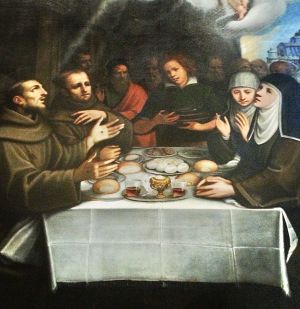
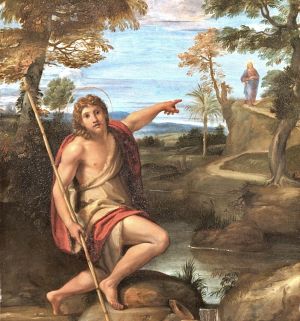
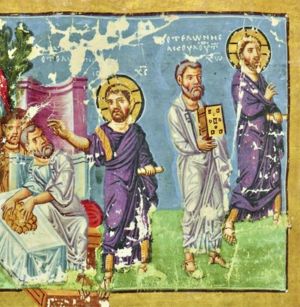
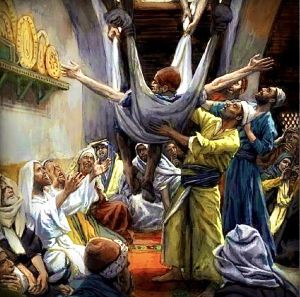
![«There came to him a leper [...] He had compassion on him, stretched out his hand, and touched him»](/media/k2/items/cache/59b909525fb3f114f9eaef8fbc6cce52_Generic.jpg)
